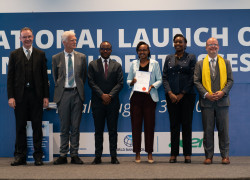PwC - Virtual currencies, digital content: the game changers
AMCHAM-APSI conference explores the latest trends in disruptive technologies
For its first conference of the 2014-2015 season, organised in collaboration with PwC Luxembourg, AMCHAM Luxembourg (American Chamber of Commerce) and APSI (Association des Professionnels de la Société de l'Information) chose to focus on virtual currencies and digital content.
These technologies have the potential to disrupt the status quo, change the way people live and work, and bring about entirely new markets and services. They also raise their own lot of questions: how will technological innovation affect operational models and business strategies? Will these technologies help companies attract new customers or force them to defend their existing bases? What are the opportunities and challenges for Luxembourg?
To discuss these topics, Philippe Pierre, APSI Vice President and partner at PwC Luxembourg, and Jean-Paul Hengen, Luxinnovation GIE and Chairman of the IT Committee at Amcham, received experts and professionals of the ICT sector at the much-anticipated industry conference.
Virtual currency: from digital to real?
With Bitcoin at the helm, the virtual-currency movement has garnered increasing attention in recent months. By allowing individual users to make transactions online without the need for an intermediary, virtual currencies are hailed by many experts as the future of e-payment.
The event’s panel, which saw Laurent Probst (PwC’s Accelerator), Jean Diederich (APSI), Jean-Louis Schiltz (Schiltz & Schiltz) and Max Wolter (Nexunity) discuss the intricacies and potential impact of recent payment technologies, was set off by Marc Hemmerling from the ABBL (Luxembourg Bankers’ Association), who explained the definition of virtual currencies as given by the European Banking Association. “Virtual currencies are defined as a digital representation of value that is neither issued by a central bank or public authority nor necessarily attached to a conventional currency, but is used by natural or legal persons as a means of exchange and can be transferred, stored or traded electronically,” said Mr Hemmerling.
The advantage for users: a significant reduction of transaction costs and waiting periods compared to traditional bank operations or payment services. However, as participants pointed out, virtual currencies remain largely unregulated, at least for now.
“Relationships between the financial sector and virtual currency schemes are tense. Banks and payment service providers see the latter as unfair competition as they do not fall under any regulatory supervision. The risks, such as hacking, account theft, money laundering and financing of terrorist activities, are unmitigated as a result,” explained Mr Hemmerling. As a result, virtual currency schemes have come under tight scrutiny from regulators. However, if the contingent risks were to be addressed by a new body of regulations, this technology could make its way to the mainstream.
So what’s in it for Luxembourg? Participants underlined the country’s long-standing savoir-faire in and innovative approach to financial services, which in turn could help it attract new businesses.
My content, anywhere, anytime
“Digital content comes in many forms, from text and audio or video files to graphics, animations and images – essentially any format that can be published, be it professional or user generated, and accessed on multiple channels or devices via the internet,” said Xavier Lisoir, director at PwC Luxembourg. “With the advent of social media, connected mobile devices, big data and cloud computing, consumers’ relation to content has dramatically changed.”
For their part, Xavier Buck (EuroDNS), Tun Van Rijswick (BCE), Laszlo Czero (Docler Holding) and Vincent Wellens (NautaDutilh) discussed the challenges faced by offline and online media businesses. What are the best solutions to monetise digital content? Should consumers pay for digital content? If not, can businesses still make money from their virtual output? As the questions of monetisation and new consumer behaviours were being debated, online piracy also emerged as a major concern for businesses.
The legal dimension of identified challenges weren’t ignored either, with participants debating the issue of legal ownership of digital content purchased online. There aren’t any statutory laws on ownership of virtual goods yet. Can a user share or pass on virtual goods like physical goods? Similar questions arose regarding user-generated content. Despite privacy matters, users continue to publish and share digital content on a massive scale.
With an attractive regulatory framework and skilled labour force, Luxembourg has managed to attract a significant number of online gaming and entertainment companies. As experts agreed, there’s still plenty of room left for innovative businesses to create new markets in the digital content area. Given its current position in the industry, the Grand Duchy constitutes the ideal gateway for companies to tackle the European market.
Held at the PwC Luxembourg premises, the AMCHAM-APSI conference attracted more than 100 guests.
Communiqués liés
RSA launches technology and management liability insurance s...
RSA Luxembourg, part of Intact Insurance Specialty Solutions, today announces th...
Lancement d'une nouvelle connexion intermodale entre Bettemb...
CFL multimodal a le plaisir d'annoncer le lancement de sa nouvelle connexion i...
Experts from LUNEX award first micro-credentials in Rwanda o...
The Rwanda Ministry of Education (MINEDUC) formally inaugurated Syllabi, a publi...
ERG Notes that ENRC Secures Landmark Victory as Court of App...
Eurasian Resources Group (ERG), a leading diversified natural resources group he...
LetzToken et La Vie est Belle annoncent leur partenariat ouv...
«?LetzToken?», plateforme de tokenisation pionnière basée à Luxembourg, et ...
ERG announces a Pre-Export Finance Facility Agreement based ...
Eurasian Resources Group (“ERG”, “The Group”), a leading diversified nat...
Il n'y a aucun résultat pour votre recherche







